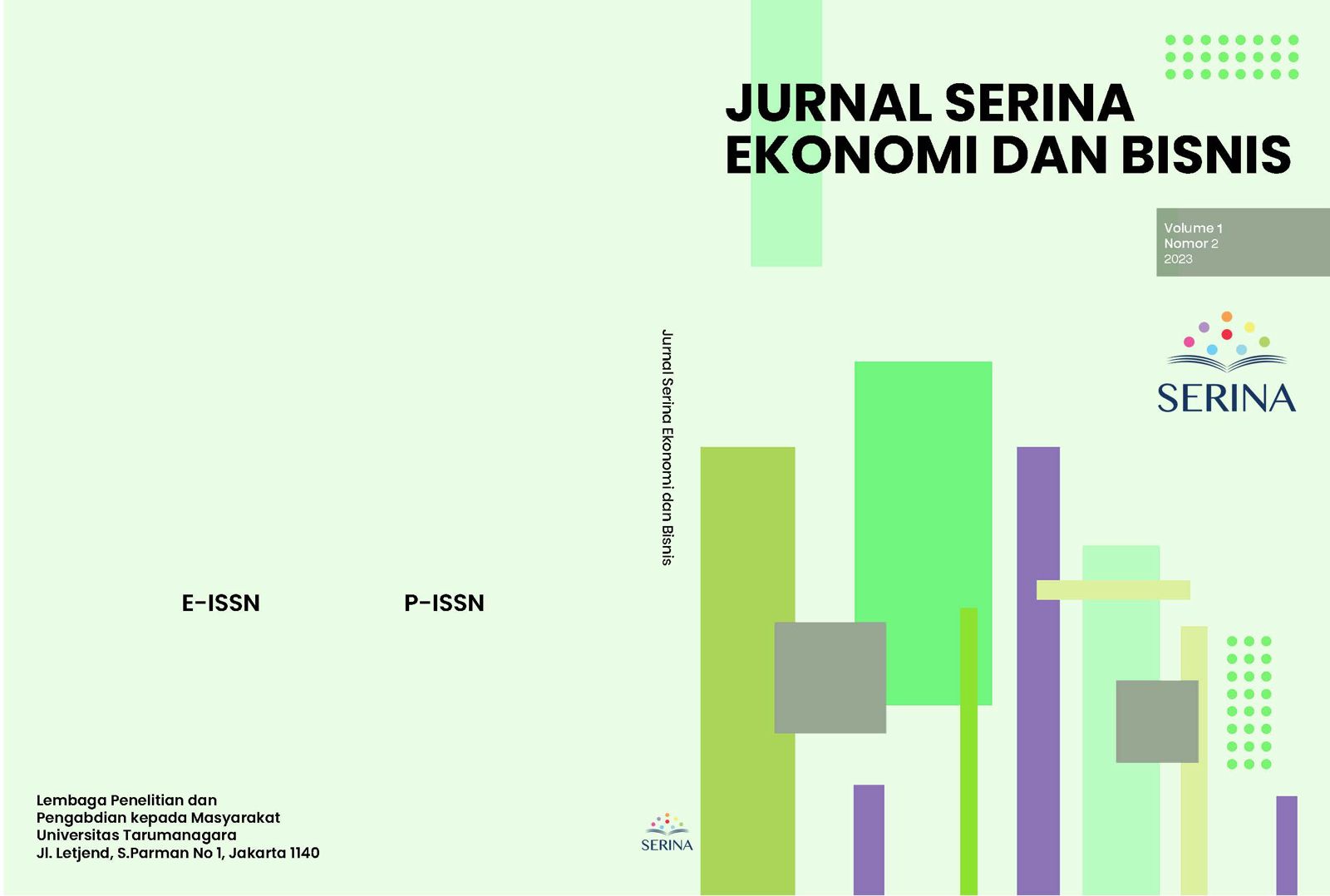KAJIAN LITERATUR MANAJEMEN RANTAI PASOK: FAKTOR PENYEBAB KEUNGGULAN KOMPETITIF PERUSAHAAN SECARA BERKELANJUTAN
Main Article Content
Abstract
Teknologi digital yang bermunculan setiap hari dan terintergrasi akan mempengaruhi hampir semua proses dan aktivitas bisnis, termasuk alur rantai pasokan. Di samping itu, perusahaan manufaktur dituntut untuk mampu memperhatikan lingkungan dengan menjaga keseimbangan alam dalam setiap kegiatannya. Alur manufaktur yang berbasis digitial dan terintegrasi serta ramah lingkungan dapat menciptakan keuntungan tersendiri bagi suatu perusahaan. Penelitian ini bertujuan untuk memberikan gambaran yang lebih mendalam terkait dengan topik digitalisasi, intergrasi rantai pasokan, dan juga rantai pasok ramah lingkungan dalam ruang lingkup manajemen rantai pasok sehingga dapat menambah pengetahuan di bidang terkait. Metode yang dipakai dalam penelitian ini adalah SLR. Peneliti berhasil mengumpulkan 18 literatur dari berbagai sumber seperti: Google Schoolar, Emerald, Research gate, Academia.edu, dan sumber lainnya untuk dianalisis. Hasil kajian literatur menunjukan bahwa ketiga variabel yang kami teliti ternyata memberikan pengaruh terhadap keunggulan kompetitif perusahaan. Penelitian sebelumnya terlihat kurang memperhatikan berbagai aspek penting secara lebih lanjut dan memiliki keterbatasan dalam penggunaan teori, metode, dan juga pengumpulan sampel. Maka disarankan bagi penelitian berikutnya untuk menggunakan teori terbaru yang relevan serta dapat melakukan penyesuaian metode yang dipakai terhadap sampel yang dikumpulkan.
Article Details
Section

This work is licensed under a Creative Commons Attribution-NonCommercial-ShareAlike 4.0 International License.
References
Al-Awamleh, H., Alhalalmeh, M., Alatyat, Z., Saraireh, S., Akour, I., Alneimat, S., ... & Al-Hawary, S. (2022). The effect of green supply chain on sustainability: Evidence from the pharmaceutical industry. Uncertain Supply Chain Management, 10(4), 1261-1270.
Alabdali, M. A., & Salam, M. A. (2022). The impact of digital transformation on supply chain procurement for creating competitive advantage: An empirical study. Sustainability, 14(19), 12269.
Astawa, I. K., Pirzada, K., Budarma, I. K., Widhari, C. I. S., & Suardani, A. A. P. (2021). The effect of green supply chain management practices on the competitive advantages and organizational performance. Polish Journal of Management Studies, 24(1).
Büyüközkan, G., & Göçer, F. (2018). Digital Supply Chain: Literature review and a proposed framework for future research. Computers in industry, 97, 157-177.
Ganbold, O., Matsui, Y., & Rotaru, K. (2021). Effect of information technology-enabled supply chain integration on firm's operational performance. Journal of Enterprise Information Management, 34(3), 948-989.
Hilal, F. (2022). The effect of green supply chain management practices and competitive advantage on financial performance. International Journal of Business, 27(1), 1-13.
Jasin, M., Sesunan, Y., Fatimah, C., Suzanawaty, L., Amalia, A., Junaedi, I., & Anisah, H. (2023). The role of green supply chain management (GSCM) on the competitiveness and performance of Indonesian manufacturing companies. Uncertain Supply Chain Management, 11(3), 1187-1194.
Khan, O., Daddi, T., & Iraldo, F. (2020). Microfoundations of dynamic capabilities: Insights from circular economy business cases. Business Strategy and the Environment, 29(3), 1479-1493.
Kusuma, I., Astawa, I. K., & Nadra, N. M. (2022). Green Supply Chain Management As Competitive Advantage at Discovery Kartika Plaza Hotel. Repositori Politeknik Negeri Bali.
Lee, S. Y. (2021). Sustainable supply chain management, digital-based supply chain integration, and firm performance: a cross-country empirical comparison between South Korea and Vietnam. Sustainability, 13(13), 7315.
Liu, K. P., & Chiu, W. (2021). Supply Chain 4.0: the impact of supply chain digitalization and integration on firm performance. Asian Journal of Business Ethics, 10(2), 371-389.
Lo, S. M., Zhang, S., Wang, Z., & Zhao, X. (2018). The impact of relationship quality and supplier development on green supply chain integration: A mediation and moderation analysis. Journal of cleaner production, 202, 524-535.
Marhamati, A., & Azizi, I. (2017). The impact of green supply chain management on firm competitiveness. International Journal of Supply Chain Management, 6(4), 215-223.
Novitasari, M., & Agustia, D. (2022). Assessing the Impact of Green Supply Chain Management, Competitive Advantage and Firm Performance in PROPER Companies in Indonesia. Operations and Supply Chain Management, 15(3), 395-409.
Novitasari, M., Alshebami, A. S., & Sudrajat, M. A. (2021). The role of green supply chain management in predicting Indonesian firms' performance: Competitive advantage and board size influence. Indonesian Journal of Sustainability Accounting and Management, 5(1), 137â-149.
Qu, K., & Liu, Z. (2022). Green innovations, supply chain integration and green information system: A model of moderation. Journal of Cleaner Production, 339, 130557.
Roz, K., Hilmi, L. D., Robbie, R. I., & Sa'Diyah, C. (2023). Green Supply Chain Management and Competitive Advantage: Evidence of Just-in-time Management on Firm Performance SMEs in Indonesia. Calitatea, 24(195), 43-50.
Sellitto, M. A., Hermann, F. F., Blezs Jr, A. E., & Barbosa-Póvoa, A. P. (2019). Describing and organizing green practices in the context of Green Supply Chain Management: Case studies. Resources, Conservation and Recycling, 145, 1-10.
Setiawan, H., Tarigan, Z., & Siagian, H. (2023). Digitalization and green supply chain integration to build supply chain resilience toward better firm competitive advantage. Uncertain Supply Chain Management, 11(2), 683-696.
Siswanto, R. (2022). Transformasi Digital Dalam Pemulihan Pendidikan Pasca Pandemi. URL: https://gurudikdas.kemdikbud.go.id/news/transformasi-digital-dalam-pemulihan-pendidikan-pasca-pandemi Diakses tanggal 3 September 2023
Stock, T., Obenaus, M., Kunz, S., & Kohl, H. (2018). Industry 4.0 as enabler for a sustainable development: A qualitative assessment of its ecological and social potential. Process Safety and Environmental Protection, 118, 254-267.
Suprapto, W., Tarigan, Z. J. H., & Basana, S. R. (2017, July). The influence of ERP system to the company performance seen through innovation process, information quality, and information sharing as the intervening variables. In Proceedings of the 1st International Conference on Education and Multimedia Technology (pp. 87-91).
Tseng, M. L., Islam, M. S., Karia, N., Fauzi, F. A., & Afrin, S. (2019). A literature review on green supply chain management: Trends and future challenges. Resources, Conservation and Recycling, 141, 145-162.
Uddin, M. (2021). Exploring Environmental Performance and the Competitive Advantage of Manufacturing Firms: A Green Supply Chain Management Perspective. International Journal of Economics & Management, 15(2).
Vanpoucke, E., Vereecke, A., & Muylle, S. (2017). Leveraging the impact of supply chain integration through information technology. International Journal of Operations & Production Management, 37(4), 510-530.
Wang, Y., Yang, Y., Qin, Z., Yang, Y., & Li, J. (2023). A Literature Review on the Application of Digital Technology in Achieving Green Supply Chain Management. Sustainability, 15(11), 8564.

